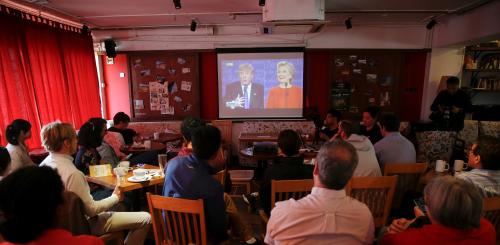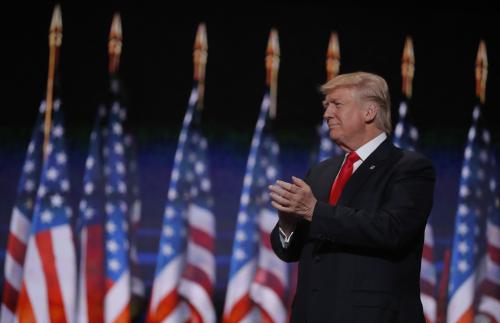Content from the Brookings Doha Center is now archived. In September 2021, after 14 years of impactful partnership, Brookings and the Brookings Doha Center announced that they were ending their affiliation. The Brookings Doha Center is now the Middle East Council on Global Affairs, a separate public policy institution based in Qatar.
After presidential candidate Mitt Romney’s speech on U.S. foreign policy, delivered on October 8, 2012, Brookings experts examine his foreign policy platform. Bruce Riedel focuses on Romney’s statements regarding the Israel-Palestine conflict, al Qaeda, and Afghanistan. Michael O’Hanlon analyzes what was most compelling about the speech and how it might help bring the foreign policy debate to the forefront of the election. Clara O’Donnell writes on what a Republican win in November would mean for Europe.
Governor Romney’s Approach to the Middle East
Bruce Riedel, Senior Fellow, Saban Center for Middle East Policy, Foreign Policy at Brookings
Governor Romney’s foreign policy speech at VMI is a timely and constructive contribution to the presidential campaign. He has delivered a thoughtful critique of the Obama record in the Middle East and provided some specific policy proposals. Importantly, Gov. Romney stated his commitment to a two state solution of the Israel-Palestine conflict, an issue his previous statements had left confused at best. Romney gave no road map for how to secure a peace agreement but he acknowledged the need to do so.
Romney also rightly assessed the threat still posed by al Qaeda. It has been bloodied in Pakistan by the 300 drone strikes since Obama’s inauguration and the death of Osama bin Laden but it is not defeated. The chaos across the Arab world has opened the door for al Qaeda’s comeback from Yemen to Mali. It is indeed clear now it had a role in the Benghazi attack on the 11th anniversary of 911. Aside from calls to leadership, however, we don’t have much answer to how a Romney administration will fight al Qaeda differently. Standing by Israel, stopping Iran’s nuclear ambitions and keeping close ties to Saudi Arabia may be good policies in their own right but don’t really address the al Qaeda challenge. Drones indeed are not a strategy, as the VMI speech notes, but what is the strategy to fight al Qaeda?
The governor was helpfully a little more clear on Afghanistan but here he also left room for more to come. He appears to accept the 2014 date for transition to Afghan leadership but seems to open the door to a reappraisal if battlefield conditions warrant. That is smart, we need flexibility. Does he mean he will keep more troops longer if his generals say they are needed? The even harder problem is how to deal with Pakistan which backs the Taliban and harbors its leaders but which has gotten $25 billion in aid from two administrations since 911, one Republican and one Democrat. How can we defeat the Taliban if Pakistan insists on backing them? Is Romney still opposed to talks with the Taliban as he stated last spring?
The VMI speech is a good start to what needs to be a far more vigorous and detailed debate in the next month. Both candidates need to be much sharper on the challenges ahead. The war in Afghanistan is eleven years old today but a successful outcome is still elusive. The Arab awakening is changing the politics of an entire region more decisively than any event in its recent history. The debate is critical. The time for vague soundbites is over.
A Good Speech for America, Regardless Who Wins
Michael E. O’Hanlon, Director of Research, Foreign Policy at Brookings, The Sydney Stein, Jr. Chair, and Senior Fellow, 21st Century Defense Initiative, Foreign Policy at Brookings
While I did not agree with everything Governor Romney said in his foreign policy speech at VMI today, and while I have particular differences of opinion with the Governor over the necessity of his proposed defense spending levels, he delivered a good speech on balance. However, the Governor’s critiques of President Obama’s handling of the attack on the U.S. consulate in Libya and the Iranian elections of 2009, as well as the Administration’s “pivot” towards Asia in recent years, were not compelling. Romney’s promise not to show flexibility towards Russia on missile defense was too categorical as well, but one must expect differences of opinion during a presidential campaign.
That said, the speech was still effective in many ways, because Romney conveyed a sense of sustained American engagement with the world that is welcome at a time when our domestic economic situation could easily produce a “Come home, America” mentality among the voting public. Instead, Romney talked about being patient in Afghanistan, and doing more to help the Libyan revolution in language that echoed that of nation-building advocates of the past. Romney also spoke of helping the Syrian opposition a bit more – without dragging the United States into war – and consolidating aid programs under a single leader in the U.S. government, which would make these programs more effective and would support certain Middle East countries in their efforts to make their revolutions succeed on terms that overlap with American interests.
These ideas generally make sense to me individually, and taken together they suggest ongoing American leadership in the world, regardless of who wins the election. I don’t know which party the speech will help most on November 6, but on balance I think it is a speech—and a type of foreign policy debate—that is good for the country either way.
What Romney Would Mean for Europe
Centre for European Reform, October/November 2012
Calara M. O’Donnell, Nonresident Fellow, Center on the United States and Europe, Foreign Policy at Brookings
As the U.S. elections approach, Mitt Romney’s sometimes bellicose rhetoric on national security is raising European eyebrows. But many in Washington believe that if the Republican contender were to become president, U.S. policies might not differ much from the last four years. Despite Romney’s strong criticism of Barack Obama, some of the challenger’s views on foreign policy issues are similar to the president’s. And the points on which they disagree may matter little: U.S. presidents rarely implement their more outlandish campaign pledges. In any case, Congress will continue to set limits on U.S. policy on issues such as the Arab-Israeli conflict and nuclear arms control, whoever the president. But, if Mitt Romney genuinely believes much of his foreign policy rhetoric, a Republican victory in November could mean difficult times for transatlantic relations.
The former governor has, for example, identified Russia as America’s “number one geopolitical foe.” He considers Obama’s ‘reset’ with Moscow to have been a failure. He opposed ratification of the New START treaty on strategic weapons reductions because it supposedly allows Russia to expand its nuclear arsenal – Romney has notably warned that the treaty, unprecedentedly, allows Russia to mount intercontinental ballistic missiles on bombers. The Republican candidate has also strongly criticised Obama’s missile defence plan as less technologically reliable and ambitious than that of George W. Bush, and for downgrading the involvement of U.S. allies Poland and the Czech Republic.
Europeans, however, welcomed the U.S.-Russia reset. Many of them worry about Vladimir Putin’s authoritarianism and non-co-operation on Syria. But most Europeans think the reset has made Russia more helpful on Afghanistan and Iran. They like New START, and many EU governments will have been confused by Romney’s concerns about bombers equipped with intercontinental ballistic missiles. Indeed it would be impossible for a bomber to take off with such a heavy load. Even EU countries that are more hawkish on Russia are likely to see Romney’s views as unnecessarily antagonistic. Initial concerns in Poland and the Czech Republic about the Obama administration’s commitment to their security have been largely addressed, after the US placed fighter jets in central Europe and started holding regular military exercises there. And Poland has been working on its own reset with Russia in recent years.



Commentary
Mitt Romney’s Foreign Policy
October 8, 2012